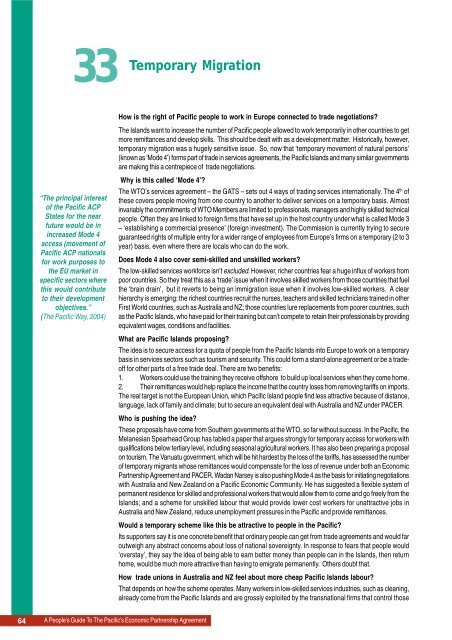REPA Booklet - Stop Epa
REPA Booklet - Stop Epa
REPA Booklet - Stop Epa
You also want an ePaper? Increase the reach of your titles
YUMPU automatically turns print PDFs into web optimized ePapers that Google loves.
33<br />
Temporary Migration<br />
How is the right of Pacific people to work in Europe connected to trade negotiations?<br />
The Islands want to increase the number of Pacific people allowed to work temporarily in other countries to get<br />
more remittances and develop skills. This should be dealt with as a development matter. Historically, however,<br />
temporary migration was a hugely sensitive issue. So, now that ‘temporary movement of natural persons’<br />
(known as ‘Mode 4’) forms part of trade in services agreements, the Pacific Islands and many similar governments<br />
are making this a centrepiece of trade negotiations.<br />
“The principal interest<br />
of the Pacific ACP<br />
States for the near<br />
future would be in<br />
increased Mode 4<br />
access (movement of<br />
Pacific ACP nationals<br />
for work purposes to<br />
the EU market in<br />
specific sectors where<br />
this would contribute<br />
to their development<br />
objectives.”<br />
(The Pacific Way, 2004)<br />
Why is this called ‘Mode 4’?<br />
The WTO’s services agreement – the GATS – sets out 4 ways of trading services internationally. The 4 th of<br />
these covers people moving from one country to another to deliver services on a temporary basis. Almost<br />
invariably the commitments of WTO Members are limited to professionals, managers and highly skilled technical<br />
people. Often they are linked to foreign firms that have set up in the host country under what is called Mode 3<br />
– ‘establishing a commercial presence’ (foreign investment). The Commission is currently trying to secure<br />
guaranteed rights of multiple entry for a wider range of employees from Europe’s firms on a temporary (2 to 3<br />
year) basis, even where there are locals who can do the work.<br />
Does Mode 4 also cover semi-skilled and unskilled workers?<br />
The low-skilled services workforce isn’t excluded. However, richer countries fear a huge influx of workers from<br />
poor countries. So they treat this as a ‘trade’ issue when it involves skilled workers from those countries that fuel<br />
the ‘brain drain’, but it reverts to being an immigration issue when it involves low-skilled workers. A clear<br />
hierarchy is emerging: the richest countries recruit the nurses, teachers and skilled technicians trained in other<br />
First World countries, such as Australia and NZ; those countries lure replacements from poorer countries, such<br />
as the Pacific Islands, who have paid for their training but can’t compete to retain their professionals by providing<br />
equivalent wages, conditions and facilities.<br />
What are Pacific Islands proposing?<br />
The idea is to secure access for a quota of people from the Pacific Islands into Europe to work on a temporary<br />
basis in services sectors such as tourism and security. This could form a stand-alone agreement or be a tradeoff<br />
for other parts of a free trade deal. There are two benefits:<br />
1. Workers could use the training they receive offshore to build up local services when they come home.<br />
2. Their remittances would help replace the income that the country loses from removing tariffs on imports.<br />
The real target is not the European Union, which Pacific Island people find less attractive because of distance,<br />
language, lack of family and climate; but to secure an equivalent deal with Australia and NZ under PACER.<br />
Who is pushing the idea?<br />
These proposals have come from Southern governments at the WTO, so far without success. In the Pacific, the<br />
Melanesian Spearhead Group has tabled a paper that argues strongly for temporary access for workers with<br />
qualifications below tertiary level, including seasonal agricultural workers. It has also been preparing a proposal<br />
on tourism. The Vanuatu government, which will be hit hardest by the loss of the tariffs, has assessed the number<br />
of temporary migrants whose remittances would compensate for the loss of revenue under both an Economic<br />
Partnership Agreement and PACER. Wadan Narsey is also pushing Mode 4 as the basis for initiating negotiations<br />
with Australia and New Zealand on a Pacific Economic Community. He has suggested a flexible system of<br />
permanent residence for skilled and professional workers that would allow them to come and go freely from the<br />
Islands; and a scheme for unskilled labour that would provide lower cost workers for unattractive jobs in<br />
Australia and New Zealand, reduce unemployment pressures in the Pacific and provide remittances.<br />
Would a temporary scheme like this be attractive to people in the Pacific?<br />
Its supporters say it is one concrete benefit that ordinary people can get from trade agreements and would far<br />
outweigh any abstract concerns about loss of national sovereignty. In response to fears that people would<br />
‘overstay’, they say the idea of being able to earn better money than people can in the Islands, then return<br />
home, would be much more attractive than having to emigrate permanently. Others doubt that.<br />
How trade unions in Australia and NZ feel about more cheap Pacific Islands labour?<br />
That depends on how the scheme operates. Many workers in low-skilled services industries, such as cleaning,<br />
already come from the Pacific Islands and are grossly exploited by the transnational firms that control those<br />
64<br />
A People’s Guide To The Pacific’s Economic Partnership Agreement
















